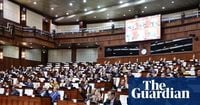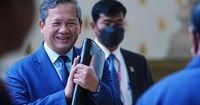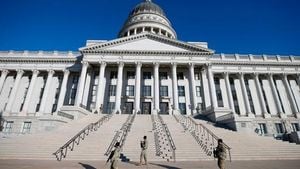PHNOM PENH, Cambodia — In a move stirring both nationalist pride and deep-seated fears about civil liberties, Cambodian lawmakers on Monday, August 25, 2025, unanimously approved a bill that grants the government sweeping new powers to revoke citizenship from anyone found guilty of conspiring with foreign nations to harm the country’s national interest. The controversial amendment to the Nationality Law passed with the support of all 120 National Assembly members present, a reflection of the overwhelming dominance of Prime Minister Hun Manet’s Cambodian People’s Party, which holds 120 of the chamber’s 125 seats.
The bill’s passage comes at a time of heightened nationalist sentiment in Cambodia, following a tense five-day border conflict with neighboring Thailand in late July that ended only after a fragile ceasefire. Against this backdrop, the government has argued that the new law is essential to protect national security and bolster patriotic feelings among Cambodians. Interior Minister Sar Sokha, addressing lawmakers before the vote, declared the update to the law “vital to boost the patriotic feelings of Cambodians while their country is facing what he characterized as an invasion by neighboring Thailand,” according to the Associated Press.
But if the government sees the measure as a necessary shield, critics warn it could become a weapon against dissent. On the eve of the vote, 50 Cambodian non-governmental organizations issued a joint statement expressing alarm at the bill’s “vaguely written” provisions, which they argue could be used to strip citizenship from activists, opposition figures, and ordinary citizens alike. The statement, cited by AP and CNN, warned, “With this new amendment to the Nationality Law, all Cambodians risk losing our identities over our activism. If we are stripped of citizenship, we will lose the foundation for every right we have in our home country.”
The NGOs further cautioned that the law “will have a disastrously chilling effect on the freedom of speech of all Cambodian citizens.” Their concerns are not unfounded, given Cambodia’s recent political history. The ruling party, led by Hun Manet and his father Hun Sen (who stepped down as prime minister in 2023 after a 38-year reign), has often been accused of using the courts—widely seen as being under the party’s influence—to throttle opposition. Notably, in 2017, the main opposition party, the Cambodia National Rescue Party, was dissolved by court order after being accused of plotting to overthrow the government with foreign help. Its then-leader, Kem Sokha, was arrested and later convicted of treason, specifically for allegedly conspiring with the United States.
While Cambodia is formally described as an electoral democracy, the reality is a political landscape tightly controlled by the Cambodian People’s Party. The new law, which applies not only to lifelong Cambodian citizens but also to dual citizens and naturalized individuals, is seen by many as yet another tool to keep political opponents in check. Some prominent critics and opposition politicians are known to hold dual citizenship, making them particularly vulnerable to the law’s reach.
Yet, the government has attempted to frame the amendment as a matter of national unity and security, not political expediency. Interior Minister Sar Sokha, in his address to lawmakers, suggested that a small group of Cambodians were “commenting and acting in a manner harmful to the country’s interests and national security.” He argued that people who directly or indirectly harm the nation and its people “should no longer be qualified as Cambodian citizens.”
Prime Minister Hun Manet, speaking in July to villagers and officials in northern Kampong Thom province, sought to reassure ordinary Cambodians that the law would not affect them unless they were actively working against the country. He said, “Please don’t be concerned if you are a patriot and do not oppose the interest of country. But if you have conspired with foreign powers to destroy Cambodia then, yes, it is true you should be worried, and in such case you are not a Cambodian.” He added pointedly, “No true patriot would ever plot with foreign powers to destroy their nation.”
Supporters of the law have pointed out that Cambodia is not alone in having such provisions. Hun Manet claimed that among nearly 200 United Nations member states, 150 countries—including the United States—have laws allowing citizenship revocation, though in most cases these laws are used sparingly and on narrowly defined grounds. “Many countries have laws allowing citizenship to be revoked, but often on narrowly defined grounds,” noted the Associated Press, providing important context for the debate.
Before the bill can become law, it must still be approved by Cambodia’s Senate and head of state, King Norodom Sihamoni. However, these steps are widely considered formalities. Both the Senate and the monarchy have historically rubber-stamped legislation passed by the National Assembly, especially when it comes from the ruling party.
The timing of the bill’s passage is no coincidence. The recent border dispute with Thailand, which saw armed conflict erupt for five days before a ceasefire was brokered, has fueled nationalist fervor and given the government an opportunity to push through measures under the guise of protecting the country during a crisis. As Cambodia’s Minister of Interior Sar Sokha put it, the law is necessary “to bolster national security amid the border dispute,” as reported by CNN and Mezha.net.
Yet, for many in Cambodia’s civil society, the law represents a step backward for democracy and human rights. They fear that the vaguely defined grounds for citizenship revocation could be used to target anyone who dares to criticize the government or advocate for reform. The experience of opposition figures like Kem Sokha serves as a stark warning of what can happen when dissent is equated with disloyalty.
The new law’s broad application—to lifelong citizens, dual citizens, and naturalized individuals—raises questions about the future of political pluralism in Cambodia. With the ruling party already in control of nearly every lever of government, and courts often seen as aligned with the executive, the risk is that citizenship itself could become conditional on political loyalty.
While Cambodia’s leaders insist the law is aimed solely at those who would “destroy the nation,” critics argue that such language is ripe for abuse. The fear, as voiced by the coalition of NGOs, is that “all Cambodians risk losing our identities through our activism.”
As the bill moves to the Senate and awaits royal assent, the country stands at a crossroads—between the promise of national security and the peril of eroding fundamental rights. What happens next will determine not just who can call themselves Cambodian, but what it means to be a citizen in the first place.






